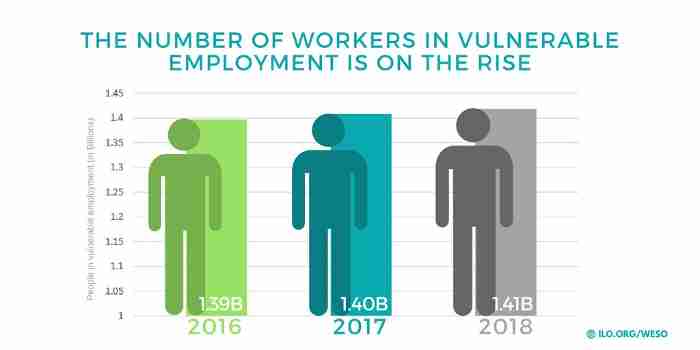Global Unemployment Expected to Rise in 2017: Report

The global unemployment rate is expected to rise modestly from 5.7 to 5.8 per cent in 2017 representing an increase of 3.4 million in the number of jobless people, a new ILO report released Thursday shows.
The number of unemployed persons globally in 2017 is forecast to stand at just over 201 million – with an additional rise of 2.7 million expected in 2018 – as the pace of labour force growth outstrips job creation, according to the ILO’s World Employment and Social Outlook – Trends 2017 (WESO).
“We are facing the twin challenge of repairing the damage caused by the global economic and social crisis and creating quality jobs for the tens of millions of new labour market entrants every year,” said ILO Director-General, Guy Ryder.
The report shows that vulnerable forms of employment – i.e. contributing family workers and own account workers – are expected to stay above 42 per cent of total employment, accounting for 1.4 billion people worldwide in 2017.
[ Free Schools for Poor Children ]
“In fact, almost one in two workers in emerging countries are in vulnerable forms of employment, rising to more than four in five workers in developing countries,” said Steven Tobin, ILO Senior Economist and lead author of the report.
As a result, the number of workers in vulnerable employment is projected to grow by 11 million per year, with Southern Asia and sub-Saharan Africa being the most affected.
The authors also warn that unemployment challenges are particularly acute in Latin America and the Caribbean where the scars of the recent recession will have an important carry-over effect in 2017.
The same impact is expected in Sub-Saharan Africa which is also in the midst of its lowest level of growth in over two decades. Both regions are confronted with strong growth in the numbers of individuals entering working age.

By contrast, unemployment should fall in 2017 among developed countries bringing their rate down to 6.2 per cent (from 6.3 per cent). But the pace of improvement is slowing and there are signs of structural unemployment.
In both Europe and North America, long-term unemployment remains stubbornly high compared to pre-crisis levels, and in the case of Europe, it continues to climb despite the receding unemployment rates.
Another key trend highlighted in the report is that the reductions in working poverty are slowing which endangers the prospects of eradicating poverty as set out in the United Nations Sustainable Development Goals.
The number of workers earning less than $3.10 per day is even expected to increase by more than 5 million over the next two years in developing countries.
At the same time, it warns that global uncertainty and the lack of decent jobs are, among other factors, underpinning social unrest and migration in many parts of the world.
Between 2009 and 2016, the share of the working age population willing to migrate abroad has increased in almost every region of the world, except for Southern Asia, South-Eastern Asia and the Pacific. The largest rise took place in Latin America, the Caribbean and the Arab States.
Turning to policy recommendations, the authors estimate that a coordinated effort to provide fiscal stimulus and an increase in public investment that takes into account each country’s fiscal space, would provide an immediate jump-start to the global economy and reduce global unemployment in 2018 by close to 2 million compared to our baseline forecasts. However, such efforts should be accompanied by international cooperation.
Photo courtesy: ILO




